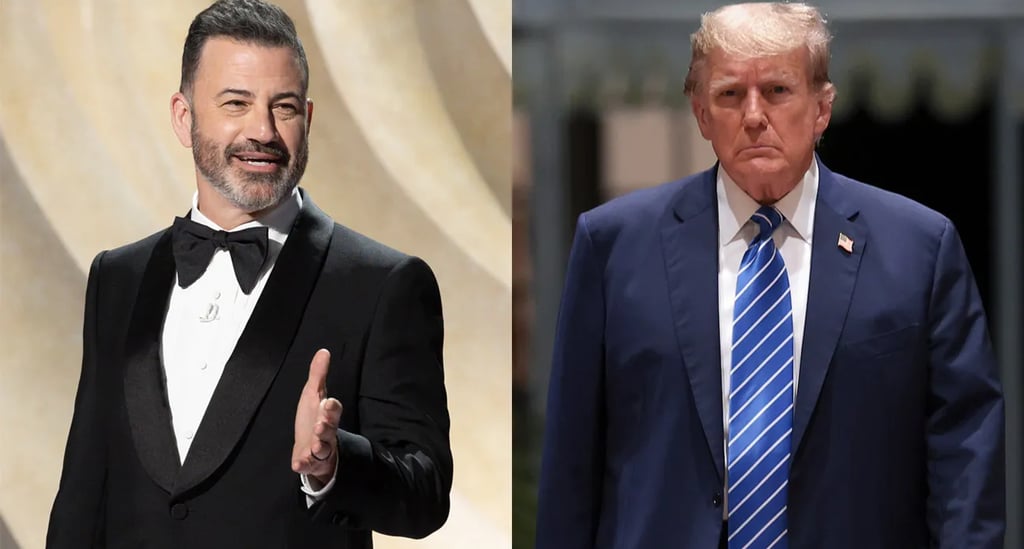“Your home for fearless film reviews, the latest entertainment news, and unfiltered movie rants.”
Jimmy Kimmel Slams Trump's 100% Tariff on Foreign Films: 'The White Lotus' Set at a Hampton Inn?
NEWS
The Tipsy Critic
5/6/20252 min read
In a recent episode of Jimmy Kimmel Live!, the late-night host humorously criticized President Donald Trump's proposed 100% tariff on foreign films. Kimmel wasted no time addressing the news, sarcastically remarking, "Trump’s now aiming his wrecking ball at Hollywood," highlighting the absurdity of targeting the film industry. His witty comment, "Next year, The White Lotus is gonna be set at a Hampton Inn," poked fun at the potential restrictions on filming locations and international collaborations that could follow if the tariff is implemented. Kimmel's critique was part of a larger comedy bit aimed at the ridiculousness of the proposal, suggesting that the move could seriously damage the global nature of filmmaking.
The 100% tariff, announced by Trump on May 4, 2025, is aimed at protecting the U.S. film industry by branding foreign-made films, particularly from China, as a "national security threat." The president claims these films spread foreign propaganda and undermine American culture. However, the proposed tariff has drawn backlash from Hollywood and film professionals. Major streaming services like Netflix, Disney+, and Amazon Prime Video have already seen their stock prices drop due to the uncertainty surrounding the tariff. The prospect of a 100% tax on foreign-made films could raise production costs, disrupt international collaborations, and limit content diversity, all while straining Hollywood's already fragile relationship with global markets.
Kimmel didn’t stop with just a humorous jab. He also pointed out the logistical issues that such a tariff would cause in an increasingly digital and interconnected film world. He sarcastically wondered how filmmakers would continue to work with international partners if a 100% tariff was imposed, saying it would undoubtedly lead to chaos in the global entertainment market. "Suddenly, your favorite international directors are being taxed, and now they can't even afford to film their passion projects," Kimmel joked. His commentary resonated with many who believe that Trump's proposal could have severe unintended consequences for both creators and audiences.
The response from the industry has been strong, with major Hollywood figures and streaming services voicing their opposition. Governor Gavin Newsom of California called the tariff plan "a devastating blow" to the state’s film industry, while Senator Adam Schiff argued that the proposal was an example of political interference in the arts. Some critics have suggested that the tariff is part of a broader effort to stifle cultural exchange and global collaboration, both of which have been critical to Hollywood’s success over the decades.
The practicalities of implementing such a tariff also remain unclear. How would foreign-made films be taxed in a world where most films are distributed through streaming platforms, making them available globally? Could the U.S. even enforce such tariffs in a digital age, where films can be easily shared across borders? These are questions that many analysts and industry professionals are grappling with. There are also concerns about how the tariff could affect the diverse content landscape, which is increasingly shaped by international collaborations and cross-border creativity.
Despite the concerns, President Trump has suggested that he may meet with industry leaders to discuss the tariff in more detail. But for now, the move has only sparked confusion and frustration among filmmakers, actors, and streaming platforms alike. Meanwhile, the conversation continues to evolve, with late-night hosts like Kimmel providing both comedic relief and sharp insights into the potential ramifications of such a policy.
The debate over the 100% tariff on foreign films is far from over. While Trump’s policy may be an attempt to bolster American culture and protect local jobs, it also raises significant questions about the future of the global film industry. Hollywood’s international reach, cultural diversity, and cross-border collaborations have been crucial to its success. A policy like this could drastically alter how films are made, distributed, and consumed. For now, all eyes are on the White House to see how the administration will respond to the growing backlash and whether the proposed tariff will go into effect.



As an Amazon Associate, I earn from qualifying purchases.
